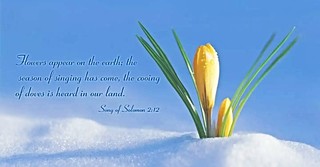- Recent Translations
- All Translations
Song of Solomon 2:17
Share
Settings
Song of Solomon 2:17 Meaning and Commentary
Until the day break, and the shadows flee away
Which may be connected with ( Song of Solomon 2:16 ) ; either with the former part, "my beloved is mine" ( Song of Solomon 2:16 ) ; and then the sense is, as long as night and day continue, and God's covenant with both stands sure; so long union to Christ, and covenant interest in him, will abide: or with the latter part, "he feedeth among the lilies until" even until his second coming: or with the next clause in this verse, turn, my beloved;
and so is a prayer for Christ's speedy coming to her, and continued presence with her, until the day should break: which may be understood either of the Gospel day made by the rising of Christ, the sun of righteousness, at his first coming in the flesh; when the shadows of the ceremonial law disappeared, Christ, the body and substance of them, being come, and the darkness of the Gentile world was scattered, through the light of the Gospel being sent into it: the words may be rendered, "until the day breathe", or "blow" F2; and naturalists observe F3, that, upon the sun's rising, an air or wind has been excited, and which ceases before the middle of the day, and never lasts so long as that; and on Christ's, the sun of righteousness, arising with healing in his wings, some cool, gentle, and refreshing breezes of divine grace and consolation were raised, which were very desirable and grateful: or this may be understood of Christ's second coming; which will make the great day of the Lord, so often spoken of in Scripture: and which suits as well with the Hebrew text, and the philosophy of it, as the former; for, as the same naturalists F4 observe, the wind often blows fresh, and fine breezes of air spring up at the setting as well as at the rising of the sun; see ( Genesis 3:8 ) ; and may very well be applied to Christ's second coming, at the evening of the world; which will be a time of refreshing to the saints, and very desirable by them; and though it will be an evening to the world, which will then come to an end, with them there will be no more night of darkness, desertion, affliction, and persecution; the shadows of ignorance, infidelity, doubts, and fears, will be dispersed, and there will be one pure, clear, unbeclouded, and everlasting day; and till then the church prays, as follows: turn, my beloved;
that is, to her; who seemed to be ready to depart from her, or was gone; and therefore she desires he would turn again, and continue with her, until the time was come before mentioned: or, "turn about" F5; surround me with thy favour and lovingkindness, and secure me from all enemies, until the glorious and wished for day comes, when I shall be out of fear and danger; or, "embrace me" F6; as in ( Song of Solomon 2:6 ) ; during the present dispensation, which was as a night in comparison of the everlasting day; and be thou like a roe, or a young hart upon the mountains of Bether;
the same with Bethel, according to Adrichomius F7; where were mountains, woody, set with trees, full of grass and aromatic plants; and so may be the same with the mountains of spices, ( Song of Solomon 8:14 ) ; where the Ethiopic version has Bethel; and so that and the Septuagint version, in an addition to ( Song of Solomon 2:9 ) ; here; see ( 2 Kings 2:23 2 Kings 2:24 ) ; unless Bithron is meant, ( 2 Samuel 2:29 ) ; a place in Gilead, beyond Jordan, so called, because it was parted from Judea by the river Jordan: and the words are by some rendered, "the mountains of division or separation" {h}; which, if referred to Christ's first coming, may regard the ceremonial law, the wall of partition between Jew and Gentile, broke down by Christ, and the two people divided by it, which were reconciled by him; if to his spiritual coming, the same things may be intended by them as on ( Song of Solomon 2:9 ) ; but if to his second coming, the spacious heavens may be meant, in which Christ will appear, and which now interpose and separate from his bodily presence; and therefore the church importunately desires his coming with speed and swiftness, like a roe or a young hart, and be seen in them; see ( Revelation 22:10 ) .
F2 (xwpyv de) (ewv ou diapneush) , Sept. "donec, vel dum spiret", Mercerus, Cocceius; "aspirat", Marckius; "spiraverit", Michaelis.
F3 Plin. Nat. Hist. l. 2. c. 47. Senecae Nat. Quaest. l. 5. c. 8.
F4 lbid. Aristot. Problem. s. 25. c. 4. "Adspirant aurae in noctem", Virgil. Aeneid. 7. v. 8.
F5 (bo) "circui", Montanus, Sanctius; "circumito"; some in Michaelis.
F6 "Complectere", Marckius.
F7 Theatrum Terrae Sanctae, p. 16.
F8 (rtb yrh le) "in montibus divisionis", Vatablus, Piscator; "scissionis", Cocceius; "dissectionis", Marckius; "sectionis vel separationis", Michaelis.
Song of Solomon 2:17 In-Context
Footnotes 1
- [a] Or on the hills of Bether.
